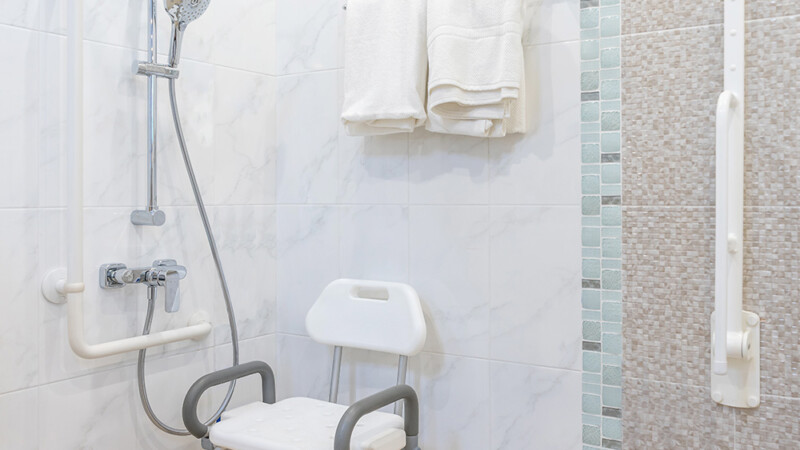
You may remember them telling you that it was time to shower and just wanting to spend 5 more minutes with whatever activity you were doing, and now, the tables have turned and you’re doing the one cajoling, suggesting, or even demanding your loved one take a shower.
Caring for an aging loved one can be a delicate and rewarding journey. As we accompany them through their senior years, we may encounter challenges, such as convincing them to engage in regular hygiene practices like showering. It can be perplexing and frustrating when our loved ones resist this essential self-care activity. However, by understanding the reasons behind their resistance and approaching the conversation with empathy and respect, we can find effective ways to encourage and support them.
Understanding the Resistance: Why Won’t Mom Bathe?

As we care for our aging parents, we may encounter resistance when it comes to convincing them to shower. It’s important to understand the reasons behind their reluctance, which can vary from person to person. By recognizing these factors, we can approach the situation with empathy and find effective solutions. Here are a few common reasons seniors resist bathing:
- They don’t realize they need one. Our senses change as we age, everything from sight, to hearing, and yes – our sense of smell. Your senior parent may not notice that they have body odor, causing them to take fewer showers and do laundry less often.
- They may be feeling depressed. Those who are depressed may lack the motivation to maintain their everyday personal hygiene. It is critical to address depression symptoms and encourage seniors to consult their doctor.
- They are modest about their body. Many seniors are hesitant to allow others to assist them with personal hygiene. They may be shy or have been raised modestly, making it difficult for them to bathe with assistance.
- They feel a loss of control. Your parent may feel as though they are losing control of their lives as they require more assistance. Most people want to maintain their independence for as long as possible, which includes using the restroom on their own and maintaining their personal hygiene.
- They are experiencing cognitive decline. If your parent has Alzheimer’s or other related dementia, they may refuse to maintain personal hygiene and it may be tough to persuade them that it has been a while since they have showered. If they are experiencing behavioral changes, depression, or an inability to recognize time, getting them to wash may be difficult.
Approaching the Conversation: How to Convince Mom to Shower
Starting this conversation with a loved one, especially a parent, can feel uncomfortable. The caregiving role reversal as parents age can bring up many complicated emotions, and it’s common to feel embarrassed or uncomfortable when having these kinds of discussions. When bringing up the topic of showering with your aging parent, it’s crucial to approach the conversation with sensitivity and respect for their autonomy.
It’s also important to take your parent’s needs and fears into consideration and adjust shower routines and shower spaces to make the experience more comfortable for them. Did Dad shower every evening before bed? Perhaps an evening shower would be more effective than one in the morning.
Following these suggestions can help foster a supportive environment that encourages cooperation.
Keep the focus on their safety and well-being. Create a safe environment for bathing – this not only helps protect them but also helps foster a sense of trust and safety that will help make them feel more comfortable bathing. When preparing a bathing space, keep these in consideration:
- Keep the temperature of the water to a comfortable level. Ask your loved one questions to gauge needed changes in temperature. Is the water too hot? Too cold?
- Use a rubber mat to prevent slips and falls
- Make use of a shower chair and safety rails
- Make use of a handheld showerhead
- To avoid falls, clean up any spilled water
Ease their embarrassment. Give your parent the maximum amount of privacy you can, while ensuring they are safe and can effectively clean themselves. Try these tips to help make the bathing experience more comfortable:
- Use large bath sheets or beach towels vs bath towels to provide maximum coverage
- Offer hand towels to cover private areas while bathing
- Ask them to assist as much as possible – only help them with areas they can’t reach
- Keep a lighthearted conversation going to help ease embarrassment and make the moment more comfortable
Make bathing a more appealing activity. There are a few ways to make bathing or showering more appealing to your senior parent. Here are a few ideas:
- Know their preferred routine. Sometimes encouraging your parent to shower is as simple as knowing what time of day they prefer to do their hygiene. If they like nighttime baths or morning showers, try to adjust your schedule around their needs as much as you can.
- Use products that they enjoy. Keep your mom’s favorite soap and shampoo handy. To get her more involved, you can make a special trip to the store and she can pick out her own shower supplies with products she likes.
- Set up family and friend visits on shower day. Knowing that company is coming can encourage seniors to clean up.
What if Mom Lives in a Senior Care Community?

Assisted living caregiver walking with senior
Senior living comes with many benefits, one of which is the availability of a whole team of trained staff who can help your loved one with their activities of daily living. Still, even with this assistance, the issue of bathing can feel complex for those whose parents reside in Your parent may feel shyer around someone who is not family, and therefore more resistant to assisted bathing. While a great caregiver will have the skills to persuade your parent to bathe, they may still need some assistance from you. Here are a few things to keep in mind when it comes to hygiene in assisted living or memory care communities:
- Engage in open and ongoing communication with the staff and caregivers responsible for your parent’s care. Discuss any concerns or preferences related to bathing, allowing for collaboration, and finding solutions that meet your parent’s needs. Senior living communities that prioritize person-centered care aim to provide individualized care plans that respect preferences and choices. By understanding your parent’s needs and preferences, the staff can develop bathing routines that are more comfortable and accommodating.
- If your parent has dementia or cognitive impairments, it’s crucial to work closely with the staff to develop strategies that address their specific needs. This may include using visual cues, incorporating familiar objects or routines, or involving specialized dementia care professionals to ensure a calm and supportive bathing experience.
- Some senior living communities offer alternatives to traditional showers, such as sponge baths or using no-rinse cleansing products. These alternatives can provide a compromise that ensures cleanliness while accommodating your parent’s preferences.
- Seniors living in these communities have the right to make decisions about their personal care, including bathing. It’s important to acknowledge and respect their autonomy, as long as their health and safety are not compromised.
By maintaining open lines of communication, understanding their preferences, and working together with the senior living community’s staff, you can ensure a positive bathing experience for your loved one while respecting their autonomy.



